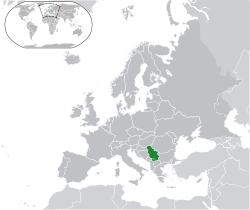Serbia: Governor Of Central Bank Resigns
By Bojana Barlovac
In a pre-emptive move, the governor of Serbia’s central bank has handed in his resignation, at the same time as the Serbian parliament was considering changes to the law that would have paved the way for his dismissal.
Dejan Soskic, the chief of the Serbia’s central bank, has informed Nebojsa Stefanovic, parliamentary speaker, that he is permantently quitting his post.
“The reason for the resignation are the proposed changes to the the Law on the National Bank of Serbia which, in my opinion, significantly curtail the independence of the central bank,” Soskic’s cabinet said in a statement.

This comes at the moment when new Serbian leaders have prepared the ground to dismiss him – the move that both the IMF and the EU strongly oppose.
The Serbian parliamentarians have been considering changes to the Law on the National Bank of Serbia today.
According to the draft amendments, Parliament’s control of the central bank has been strengthened while the capacity of the bank’s governor and management limited.
The existing law, which has been in effect since July 2010, makes it is practically impossible to dismiss the governor because only the NBS Council can propose it and the Finance Committee and Parliament then need to vote on it.
The move follows threatening statements by Prime Minister Ivica Dacic, who recently said that Serbia’s central bank governor, Dejan Soskic, may lose his job if he keeps on “tightening the belt” rather than seeking to stimulate growth.
The nationalist-led government comprised of the Progressives, the Socialists and the United Regions of Serbia, has pledged to reform the fiscal sector, curb the state spending, and improve transparency in public procurement.
However, they have refused to freeze pensions and salaries in the public sector, as the bank wants.
The Socialists also say they want the new government to draw on Serbia’s foreign reserves to stimulate the economy, a policy that Soskic strongly opposes.
The central bank is one of the few state institutions to have so far preserved its independence while maintaining relative stability in the financial system.
In recent months, the bank has succeeded in getting the annual inflation rate below 3 per cent, a record low.
The International Monetary Fund, IMF, and the EU have expressed concern over possible changes to the Law on the National Bank of Serbia.
